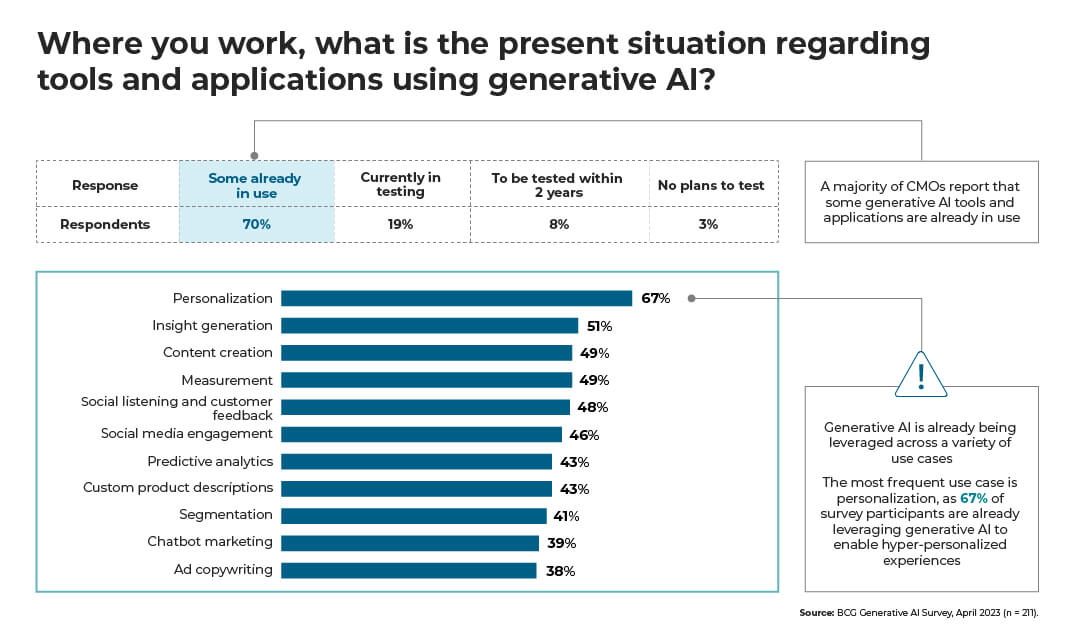Highlights
- Generative AI goes beyond analysis, creating new data. It revolutionizes data collection, management, and analysis, unlocking hidden patterns and generating impactful visualizations.
- AI automates tasks, creates synthetic data for ethical testing, and predicts trends with greater precision.
- It democratizes insights and fosters collaboration. Everyone gets real-time access to actionable information, breaking down data silos and driving better decisions.
- Ethical considerations are crucial. Deepfakes and intellectual property concerns demand responsible development and use of AI technology.
The emergence of generative artificial intelligence (AI) stands as a pivotal moment, reshaping traditional paradigms of creative content creation. The ability of these sophisticated AI models to mimic human endeavors in generating diverse content is seen by their ability to produce text and images. These include blog posts to computer code snippets. As we delve into the impact of generative AI in market research, it becomes evident that we are witnessing a transformative shift. This extends beyond mere automation, revolutionizing marketing strategies, knowledge management practices, and ethical considerations.
The prowess of generative AI models such as GPT-3, developed by OpenAI, is underscored by their capacity to adapt and create content that mirrors human-like fluency and coherence. A glimpse into the capabilities of these models reveals their potential to disrupt conventional content creation methodologies, encompassing marketing, software development, design, entertainment, and communication channels. However, it is imperative to acknowledge the nuanced interplay between human intervention and AI-generated outputs throughout the creative process.
To contextualize the scope of generative AI, it’s essential to grasp the intricate mechanisms underpinning its functionality. These AI systems leverage complex machine learning algorithms to predict subsequent words or images based on contextual cues. This reflects a remarkable synthesis of data-driven insights and predictive analytics. The initial training of these models demands substantial computational resources and data inputs. However, the subsequent fine-tuning process enables domain-specific customization with relatively minimal data requirements. Ultimately, it democratizes access to AI-driven solutions across diverse sectors.
Advantages of Generative AI in market research
Generative AI, the transformative ability of AI to produce entirely new data based on its training, is poised to fundamentally alter the landscape of market research. Beyond traditional data analysis, generative AI is redefining the entire research process. This includes data collection and management, analysis, visualization, and even insight generation. By leveraging its unique capabilities, organizations can move beyond mere data analysis. By doing so, they can unlock the true creative power of market research, driving innovation and growth in a rapidly evolving marketplace.
In fact, the growing recognition of generative AI’s value in market research is evident in its rapid adoption across industries. A recent study found that 70% of Chief Marketing Officers (CMOs) are already using generative AI. IInsight generation being the second most popular application after personalization. This widespread adoption reflects the growing understanding that generative AI. In fact, it proves that it is not just a futuristic technology, but a powerful tool for a competitive edge.

Gathering diverse data efficiently
Traditional methods of data collection, often involving manual surveys and recruitment, can be time-consuming and resource-intensive. Generative AI tools can automate these tasks, creating surveys tailored to specific research needs and efficiently reaching relevant target audiences. Additionally, by generating synthetic datasets that mirror real populations while safeguarding privacy, researchers can test concepts and scenarios in diverse and controlled environments, gaining valuable insights without ethical concerns.
Revolutionizing data management
The ever-growing volume of unstructured data, encompassing text, audio, and video, poses a significant challenge for traditional data management methods. Generative AI excels at navigating this complexity, automatically organizing and cleaning vast data sets. It can categorize and tag data with relevant attributes, summarize key points, and identify emerging themes and trends. It thereby significantly reduces the time and effort required for manual data processing.
Moving beyond traditional analytics
While not intended to replace traditional statistical analysis, generative AI can uncover hidden patterns and correlations within complex datasets that might otherwise be missed. By employing advanced algorithms, it can delve deeper into data. It explores “what-if” scenarios, predicting future trends with greater accuracy, empowering researchers to make data-driven decisions with increased confidence.
Visualizing insights for impact
Presenting research findings in a clear and concise manner is critical for effective communication and knowledge sharing. Generative AI can transform the way data is visualized and reported. Thus, creating customized reports and dashboards tailored to specific user preferences and desired insights. It can even generate narratives and summaries, catering to different audiences and communication styles. This ensures information is communicated effectively and is actionable for all stakeholders.

Harnessing collective intelligence
One of the most exciting applications of generative AI lies in its ability to synthesize insights from diverse sources. These include internal reports, social media data, and competitor analysis. This “democratization of insights” empowers all stakeholders with real-time access to actionable information, regardless of their technical expertise. By breaking down traditional data silos and providing holistic overviews, generative AI fosters a culture of data-driven decision-making throughout an organization.
Conclusion
Amidst the transformative potential of generative AI, ethical considerations loom large, epitomized by the proliferation of deepfake technologies and intellectual property dilemmas. As AI-generated content blurs the lines between authenticity and manipulation, stakeholders grapple with the imperative of safeguarding against malicious exploitation while fostering innovation and creativity.
As we embark on a journey to unravel the multifaceted impact of generative AI in market research, it becomes evident that we stand at the precipice of a new era, characterized by unprecedented opportunities and challenges. Through an exploration of real-world applications and ethical implications, this blog aims to navigate the evolving landscape of AI-driven content creation, shedding light on its transformative potential and societal ramifications.
Need comprehensive and technology-driven Market Research services that actually drive results? Netscribes has 20+ years of experience in helping leading companies reorient business strategies, identify opportunities, and survive in an ever-changing market. To leverage our expertise, contact us today.
FAQs
AI is changing market research by automating tasks, analyzing vast datasets, and offering predictive insights. From social listening to chatbots, AI assists in gathering real-time data, understanding consumer trends, and making data-driven decisions. While a powerful tool, AI complements human expertise and critical thinking in market research.
Generative AI revolutionizes market research by automating tasks such as data collection, management, analysis, and insight generation. It enables researchers to gather diverse data efficiently, navigate complex unstructured data, uncover hidden patterns, visualize insights dynamically, and harness collective intelligence from diverse sources.
Generative AI streamlines data collection processes, revolutionizes data management by organizing vast datasets efficiently, supplements traditional analytics by uncovering hidden patterns, enhances visualization of insights for impactful communication, and democratizes access to actionable information for all stakeholders.
While we can't predict the future with certainty, AI research is expected to tackle key challenges in the coming years. This includes making AI systems more transparent and unbiased, ensuring their safety and ethical use. Additionally, researchers will likely delve into pushing the boundaries of AI capabilities, exploring areas like artificial general intelligence and fostering human-AI collaboration. Ultimately, the future of AI research lies in its real-world application, aiming to integrate AI seamlessly into various sectors and improve our lives through solving complex problems in areas like healthcare, manufacturing, and transportation.






